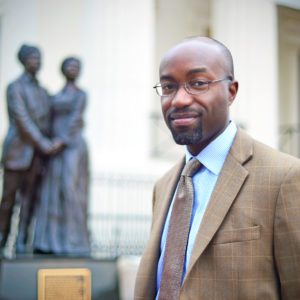A new, 115-page community-driven report on segregation and housing in St. Louis was released April 25 by numerous local partners in the fields of public health, law, fair housing and community development.
“Segregation in St. Louis: Dismantling the Divide” is the product of a collaborative partnership involving For the Sake of All, ArchCity Defenders, Ascend STL, Inc., Community Builders Network of Metro St. Louis, Metropolitan St. Louis Equal Housing and Opportunity Council (EHOC), Empower Missouri and Team TIF St. Louis.
For the Sake of All, an initiative of the Brown School at Washington University in St. Louis, is working to improve health equity for African-Americans in the St. Louis region.
The report was formally introduced at a sold-out conference of the same name co-hosted by For the Sake of All and EHOC. Richard Rothstein, author of “The Color of Law: A Forgotten History of How Our Government Segregated America,” was the keynote speaker. Afternoon workshops were led by organizations already working to implement the report’s 11 policy recommendations in the areas of affordable housing, equitable development, and housing and neighborhood stability. Participants learned about the recommendations and ways to promote and accelerate progress.
“We expect the report to both educate and energize the St. Louis community regarding fair and equitable housing,” said Will Jordan, executive director of EHOC. “The report presents recommendations to combat segregation that can be accomplished on the local level. Much of this work is underway, but could benefit from increasing community understanding and mobilized support.”
The recommendations support the creation and increased funding of affordable housing trust funds in St. Louis County and the City of St. Louis, the creation of a “greenlining fund” to enable homeownership in neighborhoods that were once “redlined” out of home mortgage lending, tax increment financing reform, investment in a community reinvestment fund, renter protections, eviction prevention and more.
The latest report is the culmination of two years of community meetings and cross-stakeholder collaboration to better foster quality neighborhoods — a priority that originated from the May 2014 report, “For the Sake of All: A Report on the Health and Well-Being of African Americans in St. Louis and Why It Matters for Everyone.”
The “Dismantling the Divide” report presents an overview of more than a century of damaging federal, state and municipal policies; real estate practices; and development strategies. These practices and policies have kept many of the St. Louis region’s residents segregated in neighborhoods with less opportunity to advance economically and fewer resources to support health and well-being.
It also presents new research on how St. Louis residents of all races and socio-economic backgrounds are often disconnected and excluded from opportunity by these significant housing divides that put St. Louis among the top 10 most segregated regions in the country. The report features various regional maps highlighting inequitable access to vital resources resulting, in part, from residential segregation.
Many of these findings are coupled with personal stories of residents in the St. Louis region coping with housing divides that limit access to quality education, job opportunities, health care, retail, transportation, clean air, empowering social networks and other critical resources.
The report also contains a unique “index of exclusivity” that ranks 41 suburban communities/areas in our region regarding housing inaccessibility for lower-income people and/or African Americans.
“I think many people will be disturbed to see where their communities rank, particularly when they learn of the many policies and practices that went into making them that way,” said Jason Purnell, associate professor at the Brown School and director of For the Sake of All.
“There is a disturbing history of pervasive policies and practices that established and maintain segregation in St. Louis,” he said. “We hope that the report educates residents about that history and supports the kind of creative collective action needed to reverse over a century of destructive policy.”
The report was completed with support from the Missouri Foundation for Health and Wells Fargo.

